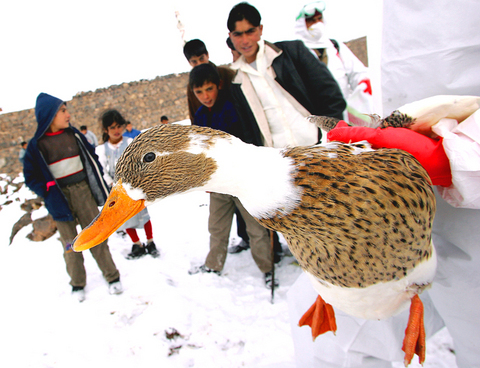The World Health Organization's (WHO) top official in Asia said yesterday that east Asia remained the region at greatest risk for the spread of the deadly H5N1 bird flu virus.
"Although there are new developments in Turkey, the situation in Asia is more serious than in any other part of the world," said Shigeru Omi, the WHO's regional director for the Western Pacific.
Omi was in Tokyo yesterday ahead of a two-day conference aimed at measuring how ready Asian countries are to identify and respond to a potential flu pandemic.

PHOTO: AP
The deaths of two more people in China and two in Turkey have brought the global toll from bird flu to 78, WHO said yesterday as it urged stepped-up preparation in case the illness turns into a pandemic strain.
Word of the latest two deaths in China -- a 10-year-old girl in the south and a 35-year-old man in the east -- followed confirmation by WHO of two bird flu fatalities in Turkey as the first outside eastern Asia.
Omi said much progress has been made over the past year in preparing for a worst-case pandemic scenario, with the international community coming together as one to "tackle this as a common enemy," but much work remains.
"The biggest challenge is how you translate this commitment into action, especially at the grassroots level where the infection is now occurring," he said.
Meanwhile, Turkey's European neighbors yesterday stepped up border checks against bird flu, disinfecting trucks and passing out fliers, and officials said the risk of the disease spreading westward has increased.
The deadly H5N1 flu strain has infected 15 people in Turkey, including two children who have died, according to preliminary tests.
In Greece, 500 additional veterinary staff were sent to border areas and state laboratories to speed up results on random bird tests, officials said. Motorists and truck drivers entering Greece from Turkey had their vehicles sprayed with disinfectant and were handed leaflets explaining how bird flu is spread.
"Whatever is humanly possible is being done. The development of the disease in Turkey is not good. ... We must not panic and we must not relax," Greek Health Minister Nikitas Kaklamanlis said after an emergency meeting on bird flu.
The latest events in China, which has the world's biggest poultry industry, triggered further alarm just a day after the government warned the H5N1 crisis had not yet peaked and human-to-human transmission remained possible.
The WHO's spokesman in Beijing, Roy Wadia, said the latest two to die were a a 10-year-old girl in the southern Guangxi Province on Dec. 16 and a 35-year-old man in the eastern province of Jiangxi Province on Dec. 30.
also see story:
From affection to affliction

MORE VISITORS: The Tourism Administration said that it is seeing positive prospects in its efforts to expand the tourism market in North America and Europe Taiwan has been ranked as the cheapest place in the world to travel to this year, based on a list recommended by NerdWallet. The San Francisco-based personal finance company said that Taiwan topped the list of 16 nations it chose for budget travelers because US tourists do not need visas and travelers can easily have a good meal for less than US$10. A bus ride in Taipei costs just under US$0.50, while subway rides start at US$0.60, the firm said, adding that public transportation in Taiwan is easy to navigate. The firm also called Taiwan a “food lover’s paradise,” citing inexpensive breakfast stalls

TRADE: A mandatory declaration of origin for manufactured goods bound for the US is to take effect on May 7 to block China from exploiting Taiwan’s trade channels All products manufactured in Taiwan and exported to the US must include a signed declaration of origin starting on May 7, the Bureau of Foreign Trade announced yesterday. US President Donald Trump on April 2 imposed a 32 percent tariff on imports from Taiwan, but one week later announced a 90-day pause on its implementation. However, a universal 10 percent tariff was immediately applied to most imports from around the world. On April 12, the Trump administration further exempted computers, smartphones and semiconductors from the new tariffs. In response, President William Lai’s (賴清德) administration has introduced a series of countermeasures to support affected

CROSS-STRAIT: The vast majority of Taiwanese support maintaining the ‘status quo,’ while concern is rising about Beijing’s influence operations More than eight out of 10 Taiwanese reject Beijing’s “one country, two systems” framework for cross-strait relations, according to a survey released by the Mainland Affairs Council (MAC) on Thursday. The MAC’s latest quarterly survey found that 84.4 percent of respondents opposed Beijing’s “one country, two systems” formula for handling cross-strait relations — a figure consistent with past polling. Over the past three years, opposition to the framework has remained high, ranging from a low of 83.6 percent in April 2023 to a peak of 89.6 percent in April last year. In the most recent poll, 82.5 percent also rejected China’s

PLUGGING HOLES: The amendments would bring the legislation in line with systems found in other countries such as Japan and the US, Legislator Chen Kuan-ting said Democratic Progressive Party (DPP) Legislator Chen Kuan-ting (陳冠廷) has proposed amending national security legislation amid a spate of espionage cases. Potential gaps in security vetting procedures for personnel with access to sensitive information prompted him to propose the amendments, which would introduce changes to Article 14 of the Classified National Security Information Protection Act (國家機密保護法), Chen said yesterday. The proposal, which aims to enhance interagency vetting procedures and reduce the risk of classified information leaks, would establish a comprehensive security clearance system in Taiwan, he said. The amendment would require character and loyalty checks for civil servants and intelligence personnel prior to